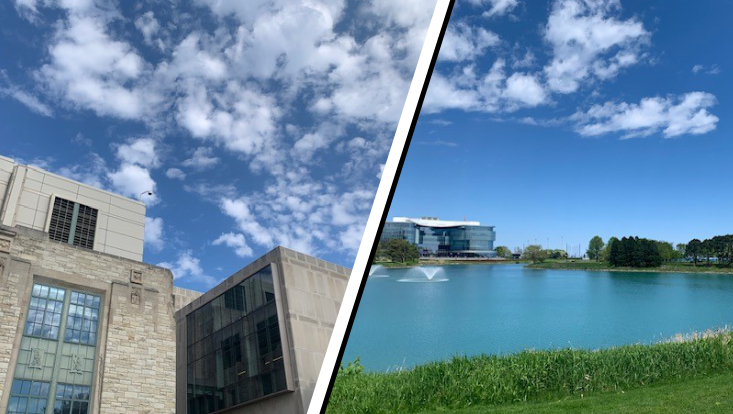CLIMATE AND EARTH
SYSTEM SCIENCES
Photo: UHH/Denstorf
4 November 2024

Photo: Shuyue Qu
Every day she was at Lake Michigan enjoying the views, exploring the USA, meeting great people while working towards her dream career and advancing a research project: Shuyue Qu. She is the first ICSS Student, who spent three months in the USA as part of the SICSS exchange program with Northwestern University in Evanston, Chicago. On site she worked on her Climate Study Project which is important preparatory work for her Master’s thesis. In our interview, she shares her experiences.
What did a typical day look like for you in Evanston?
My day usually started with a relaxed breakfast. After that, I took a slightly longer route along Lake Michigan to reach the office. Working there was fantastic. We had the opportunity to discuss our topics and research questions with colleagues. In the evenings, I either went grocery shopping or spent time with friends.
What was your research about?
My research in the USA focused on using machine learning methods to explore the impact of extreme heat events and air pollution on public health in Chicago and Hamburg, with an emphasis on handling environmental and health data. I learned new approaches for data processing during my time there.
How was studying in the USA different from studying here in Germany?
The study atmosphere in Germany was relatively relaxed, whereas in the USA, it was very active and dynamic. We had weekly group meetings every Friday, and I saw my colleagues daily, even those working on completely different topics. This constant exchange encouraged discussions about data analysis, simulations, and problem-solving. In contrast, studying in Germany often had a slower pace, focusing more on independent work and problem-solving.
How did your research and academic skills change because of the exchange?
Before my exchange, when I encountered problems in my research, I mainly looked up papers or tried to figure things out on my own. In the USA, I learned that I could always ask my supervisor or colleagues for help - they often had great ideas!
How did you spend your free time during your stay in Chicago?
I particularly enjoyed walking along Lake Michigan in my free time - it was absolutely breathtaking. The views of the water and the beautiful promenade made it a wonderful experience. I believe I went to the beach almost every day. Additionally, I often hung out with other graduate students, and we took day trips to other states, riding the subway or train to explore new places.
What did the exchange bring you personally?
Academically, I made significant progress, discovering a field I was truly passionate about and hoped to pursue as a career. Personally, this experience broadened my horizons. I met many outstanding classmates and formed great friendships, sharing unforgettable moments together.
Were there any challenges during your stay?
Finding accommodation presented significant challenges, but through persistent effort, I eventually found an ideal and affordable place. The main challenge was indeed securing housing, but I learned that I needed to be proactive and not wait around for help. Staying positive and actively seeking solutions helped me overcome the hurdles.
Where exactly is the campus located?
Our campus is located in Evanston, which is just north of Chicago. The university has two campuses - one in Evanston and another in downtown Chicago. It is convenient to take the shuttle to explore everything Chicago has to offer. However, Evanston itself is very safe, peaceful, and beautiful.
What is your recommendation for other students? Why should they also seize the opportunity for this exchange?
This opportunity was a dual source of inspiration for both personal experience and academic growth. Northwestern University offered excellent facilities and support, and the people—including Dr. Grayson, my advisor Dr. Horton, and my colleagues in the Climate Change Research Group (CCRG) and Earth and Planetary Science Department—were incredibly friendly and talented. The work ethic and approaches I learned from them will benefit me for a lifetime. If I could give a recommendation score, it would be off the charts—200 out of 100.